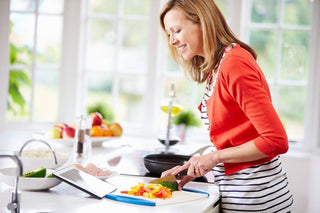Between parties and celebrations, you eat out a lot more often during the holidays. And this means that more than half of us will gain at least a pound, and 10% of us will gain five pounds or more.
Still, while we might put “lose weight” at the top of our resolutions list, more often than not, the weight stays on. So what can you do to reverse this trend? You could take a lean meal replacement, or you could start cooking your meals at home.
A study by researchers at Johns Hopkins University, published in the journal Public Health Nutrition, says cook and eat at home. They found that people who cook at home eat healthier and consumer fewer calories than those who cook less frequently.
“The evidence shows people who cook at home eat a more healthy diet”
The researchers conducted a review of the 2007-2010 National Health and Nutrition Examination Survey from more than 9,500 adults age 20 and older. The study included detailed questions about participants’ eating habits over the short term and long term - the 24 hour period preceding the questioning, as well as what they ate during the past 30 days.
Results revealed that about 8% of adults cooked dinner once or fewer times a week, and these participants consumed an average of 2,301 calories, 84g of fat, and 135g of sugar daily. By contrast, 48% of adults cooked dinner six to seven times a week, and averaged 2,164 calories, 81g of fat, and 119g of sugar per day.
This means a daily difference of 137 calories, which, over a week, adds up to an additional 959 calories.
A number of factors contributed to eating out more often, including busy schedules – people who worked more than 35 hours per week outside the home cooked less often.
And those who cooked at home were more inclined to eating healthfully – they were less reliant on frozen foods and were less likely to choose to eat fast food when they did eat out.
“Obesity is an escalating public health problem that contributes to other serious health issues, including diabetes, high blood pressure, and heart disease,” said lead researcher Julia Wolfson, MPP, a CLF-Lerner Fellow at the Johns Hopkins Center for a Livable Future.
“The evidence shows people who cook at home eat a more healthy diet. Moving forward, it’s important to educate the public about the benefits of cooking at home, identify strategies that encourage and enable more cooking at home, and help everyone, regardless of how much they cook, make healthier choices when eating out.”
The Bottom Line
If this doesn’t convince you to prepare more meals at home, another recent study might tip you over the edge. It turns out that getting kids involved in the kitchen, through cooking classes at home, may make them more likely to choose healthy foods. Cooking programs and classes for children seem to positively influence their food preferences and behaviors, and exposing kids to healthy foods on a number of occasions makes them feel comfortable with new foods, helping them build healthy habits.
If you’re aiming to lose weight during the New Year, cooking from home makes sense. Research shows that people who are good at resisting temptation deliberately avoid situations that test their self-control. So by cooking your own food, you can opt for healthy choices like vegetables and avoid those overly large portions of rich, calorie-laden foods.
But what makes it so hard for us to cook at home more? One major limitation is time, but another is that there’s a whole new generation of adults who never really learned how to cook, how to navigate a grocery store, or how to read labels for nutrition facts. And we can’t forget that financial constraints are also a consideration for some people.
If you’re not in the habit of cooking at home, here are some tips to help you get started:
- Start gradually. Set a goal to cook once or twice a week, and work up to cooking more often.
- Take a class. There are often cooking demonstrations or classes available at cookware stores and even restaurants, so make it an event and have fun!
- Plan ahead. Make a list of all the things you need for your meal, and have them washed and ready to go when you need.
- Make cooking a family event. Enlist the help of your partner and children, so the whole family can learn how to make a healthy meal.
Another good place to start, especially in the winter, is by learning how to make soup. Soups are economical, very healthy, easy to make, and you can make a batch on the weekend and use for lunches during the week – great, if you don’t have a lot of time. Check out our simple and delicious soup recipes for all the steps you need to get cooking right away!

